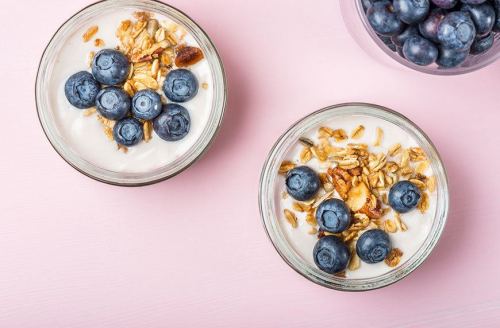For those of us who love our coffee, there may be times when it doesn’t seem to love us back. For instance, we might feel more jittery than usual when drinking coffee on an empty stomach or after a poor night’s rest. And sometimes, that java doesn’t really sit well with our digestion. There could be a few reasons why your gut’s a bit worse for wear upon getting in your coffee fix—and it turns out that the speed in which you finish your cup could be one of them.
Experts in This Article
Brooklyn–based registered dietitian
To see what the deal is with drinking your coffee too fast and how that could result in digestive discomfort, we enlisted the help from Brooklyn–based dietitian Maddie Pasquariello, MS, RDN.
How does drinking coffee quickly impact digestion?
According to Pasquariello, the volume of the liquid you ingest can definitely disrupt the normal digestive process. “As soon as you start to drink a liquid or eat food, the taste buds on your tongue communicate with the brain in a cascade of anticipatory reflexes that prepare your body to process and digest,” Pasquariello says. “A series of small sips essentially triggers the brain that you’re drinking a liquid, telling it to get ready to absorb any nutrients in that liquid.”
Essentially, savoring a drink—not gulping it down straight away—helps to prepare your salivary enzymes, ensuring that the start of the digestive process kicks off as it should. On the flip side, a rapid chug and/or large gulps can hinder business as usual. “By holding your beverage in your mouth for a little longer before swallowing—i.e. by taking small sips—your saliva has more time to come into contact with the liquid, which can be beneficial from a gastrointestinal standpoint,” Pasquariello says.
Taking big gulps may also lead to aerophagia, or swallowing too much air, which can contribute to digestive upset. “Aerophagia can have uncomfortable GI symptoms like bloating, gas, nausea, burping, or pain. It can also make you feel a bit breathless,” says Pasquariello. “This process offers additional implications for beverages that contain stimulants like coffee or depressants like alcohol, because the speed by which you consume them will affect how quickly these substances hit your bloodstream.”
Can drinking coffee more slowly reduce digestive upset?
Simply put: Yes. “Based on our understanding of the digestive process overall, it’s reasonable to expect that by sipping your coffee slowly over the course of an hour—say, compared to chugging a cold brew or an espresso shot in one go—would result in a more gradual onset of any symptoms,” says Pasquariello. Such symptoms include types of digestive discomfort but also jitters and an elevated heart rate.
Pasquariello notes that there’s a lack of research indicating the ideal time in which you should finish your cup of coffee to bypass undesired side effects. However, she does have a window in mind that may be beneficial in a few ways. “I’d say you’ll probably experience the best balance of minimizing side effects while ensuring the cup still tastes good by drinking it within about 15 to 30 minutes,” she explains.
If you wait much longer than that, Pasquariello says that the taste of your coffee might not be as palatable, as oils turn rancid as coffee cools down. Moreover, she warns that prolonging exposure to the surface of your teeth—via sugary lattes and similarly sweetened caffeinated drinks—“can increase your likelihood for the negative effects of bacterial proliferation like cavities.”
4 tips to limit digestive distress from coffee
To ensure that your coffee intake agrees with your digestion and your health at large, Pasquariello signs off with a few GI-friendly tips that go beyond being mindful of your sipping speed and volume:
1. Try to wait before drinking coffee in the morning
Cortisol levels are at their peak up to 30 minutes upon waking up, Pasquariello shares—and drinking coffee when your stress hormones are highest can mean bad news for your nerves and digestion alike.
“High levels of cortisol suppress digestion as part of the body’s fight or flight response, so you can actually inhibit proper digestion later on by amping up your cortisol levels,” says Pasquariello. With that in mind, she advises waiting at least 45 minutes to an hour before enjoying your first (slow) sips of coffee after rising and shining.
2. Drink coffee with food
The RD reminds us that drinking coffee on an empty stomach can trigger any number of adverse effects in your digestive system (nausea, IBS-C, cramping) and nervous system (anxiety, rapid heart rate, and so on.). While some people may enjoy the fact that caffeine can “hit” you quicker on an empty stomach, those with the aforementioned sensitivities are better suited to sip up with a meal or snack.
3. Watch out for additives that can trigger GI issues
Even if you take well to caffeine, you may not be able to say the same about coffee additives. “One of the big reasons that [coffee] can be especially triggering to the GI system is because we tend to consume it with high amounts of dairy and sugar,” Pasquariello notes. She says that these extras can be the real culprit behind why your tummy gets twisted, rather than the caffeine itself.
However, some additives can actually end up assisting the digestive process in sensitive individuals—namely because coffee is highly acidic. “Adding a splash of creamer or additional hot water to your coffee can reduce its acidity,” Pasquariello says. A pinch of baking soda, it turns out, can also do the trick. She also recommends opting for cold brew or espresso—as well as darker roasts over lighter ones—since they’re often less acidic than standard filtered brews.
Again, just remember to savor your coffee of choice, sipping slowly when possible.
4. Time your coffee intake with your sleep schedule
By sipping multiple cups of coffee within a tighter timeframe (rather than over the course of several hours throughout the day), “you’ll start the process of clearing it from your system in a tighter timeframe as well,” Pasquariello says. Shortening the overall window in which you drink up can mitigate digestive issues *and* the possibility of caffeine sabotaging your plans to catch high-quality ZZZs. After all, caffeine and sleep aren’t an ideal match—and consistent, restful sleep supports healthy digestion.
Sign Up for Our Daily Newsletter
Get all the latest in wellness, trends, food, fitness, beauty, and more delivered right to your inbox.
Got it, you've been added to our email list.










